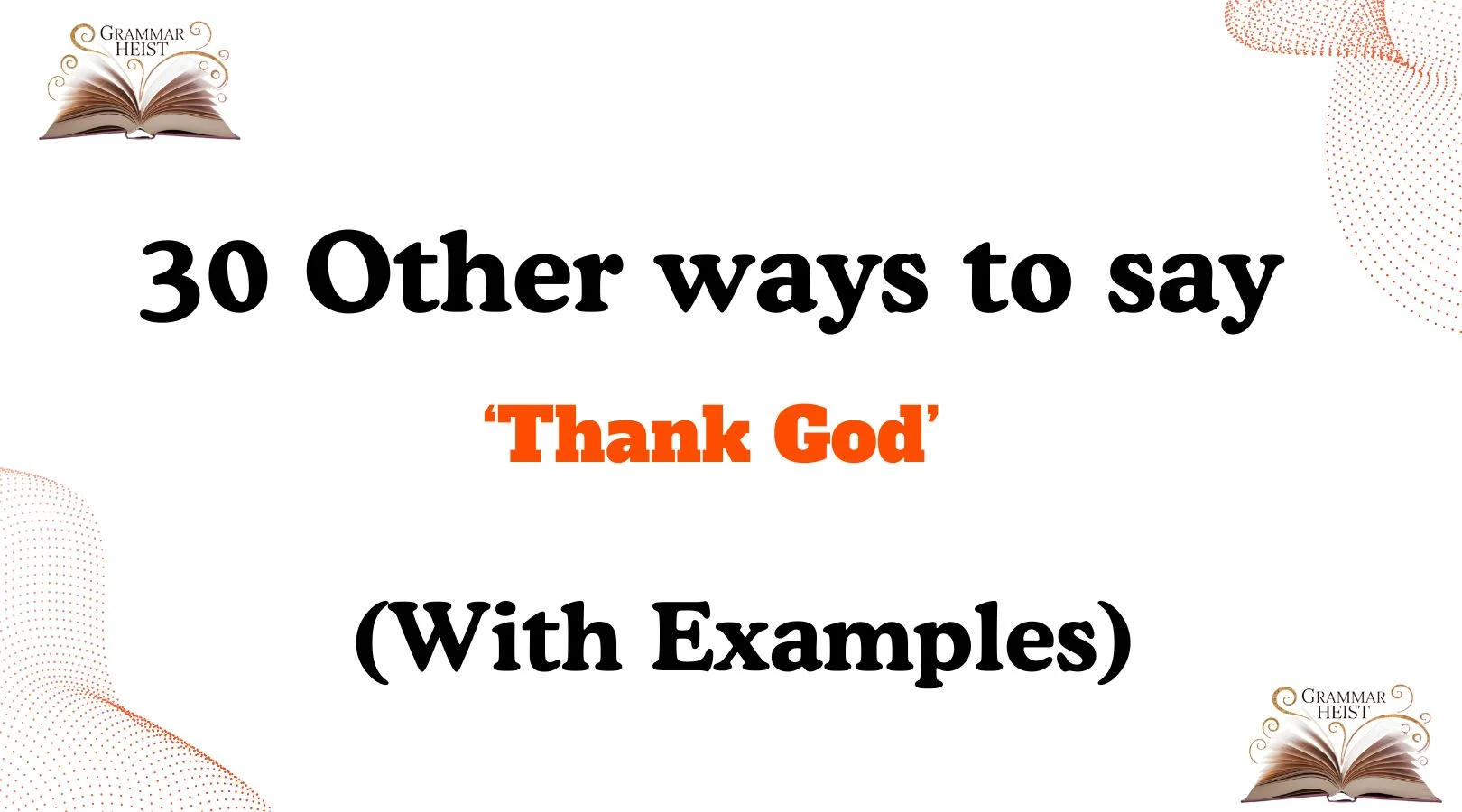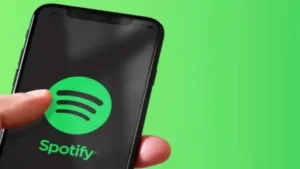Finding the right words to express relief, gratitude, or joy can make conversations more personal and meaningful. While the phrase “Thank God” is widely used, sometimes we want an alternative that feels warmer, more thoughtful, or even more professional depending on the situation. In this guide, you’ll discover 30 other ways to say “Thank God”, each with scenarios, tone, and examples to help you use them naturally in everyday conversations.
What Does “Thank God” Mean?
The phrase “Thank God” is used to express relief, gratitude, or happiness when something positive happens. It often reflects thankfulness for avoiding a bad situation or for receiving good news.
Is It Professional/Polite to Say “Thank God”?
Yes, but it depends on the setting and audience. In casual or personal conversations, “Thank God” feels natural and heartfelt. However, in professional or diverse settings, where not everyone may share the same beliefs, it may be better to use a neutral alternative like “What a relief” or “I’m so glad.”
Pros or Cons of Saying “Thank God”
Pros:
- Expresses genuine relief and gratitude.
- Universally understood.
- Shows emotion and care.
Cons:
- May sound too casual in formal settings.
- Could be seen as religious-specific, which might not fit every audience.
- Some people may prefer a neutral tone.
Synonyms For “Thank God”
- Thank Goodness
- What a Relief
- I’m So Glad
- Thank Heavens
- I’m Relieved
- Phew
- I’m So Thankful
- Luckily
- Thank the Stars
- I’m Grateful
- That’s a Blessing
- What Luck
- I’m Fortunate
- Thank the Universe
- Thank Everything
- Thank Heavens Above
- Thank the Lord
- Saved by the Bell
- Thank My Lucky Stars
- Hallelujah
- I’m Overjoyed
- Finally
- Thank You So Much
- I’m Ecstatic
- Thank the Day
- That’s Wonderful
- I’m Lucky
- Praise Be
- What Great News
- I’m Beyond Happy
1. Thank Goodness
Scenario: Use when you feel relieved in a lighthearted or friendly way.
Examples:
- Thank goodness the exam is finally over.
- Thank goodness you arrived safely.
- Thank goodness it didn’t rain during the wedding.
Tone: This phrase sounds friendly, warm, and casual—it keeps the comfort of “Thank God” without sounding too heavy.
Explanation: “Thank goodness” works in both casual and polite situations. It is non-religious, making it safe to use in mixed or professional groups while still showing relief.
2. What a Relief
Scenario: Use when a stressful or worrying situation has finally ended.
Examples:
- What a relief that she found her keys.
- What a relief the storm didn’t hit our town.
- What a relief the project was approved.
Tone: This phrase feels professional, calm, and neutral—it removes strong emotions but still communicates gratitude.
Explanation: A great choice for emails, workplace settings, or polite conversations. It emphasizes the ending of stress or tension.
3. I’m So Glad
Scenario: Use in both personal and professional contexts to show happiness and relief.
Examples:
- I’m so glad you made it safely.
- I’m so glad we solved the problem.
- I’m so glad the kids enjoyed the trip.
Tone: It feels warm, caring, and inclusive, showing genuine joy without being dramatic.
Explanation: “I’m so glad” is versatile—you can use it at work, with friends, or family. It shows gratitude and kindness in a universal way.
4. Thank Heavens
Scenario: Use when something unexpectedly good happens, avoiding trouble.
Examples:
- Thank heavens you called in time.
- Thank heavens the car started after all.
- Thank heavens the package arrived today.
Tone: This has a slightly dramatic yet lighthearted tone—common in storytelling or casual conversation.
Explanation: “Thank heavens” carries a classic, expressive charm. It’s still polite, but feels more emotional than “thank goodness” or “what a relief.”
5. I’m Relieved
Scenario: Use when stress or tension has ended, and you feel lighter.
Examples:
- I’m relieved the surgery went well.
- I’m relieved we finished before the deadline.
- I’m relieved you made it safely.
Tone: This sounds calm, professional, and composed.
Explanation: “I’m relieved” emphasizes the emotional release after worry, making it suitable for both personal and workplace conversations.
6. Phew
Scenario: Use in casual, friendly talk to show quick relief.
Examples:
- Phew, I thought I was late.
- Phew, that was close.
- Phew, you remembered to lock the door.
Tone: This is informal, expressive, and lighthearted.
Explanation: “Phew” is great for friends or casual chats, but avoid it in formal or professional emails.
7. I’m So Thankful
Scenario: Use when showing heartfelt gratitude.
Examples:
- I’m so thankful you’re okay.
- I’m so thankful the results are positive.
- I’m so thankful we met today.
Tone: This phrase feels warm, emotional, and genuine.
Explanation: “I’m so thankful” goes beyond relief—it adds gratitude. Best for personal and meaningful moments.
8. Luckily
Scenario: Use when something turns out well by chance.
Examples:
- Luckily, the traffic wasn’t too bad.
- Luckily, she remembered her passport.
- Luckily, we got the last table at the restaurant.
Tone: This phrase is neutral and light, making it flexible.
Explanation: “Luckily” fits professional, academic, or casual settings. It shows gratitude for good timing or luck.
9. Thank the Stars
Scenario: Use when expressing dramatic or playful relief.
Examples:
- Thank the stars the weather cleared up.
- Thank the stars we caught the last bus.
- Thank the stars it all worked out.
Tone: This phrase is poetic, slightly dramatic, and expressive.
Explanation: It adds a creative flair, often used in storytelling or casual chats.
10. I’m Grateful
Scenario: Use when acknowledging something positive with sincerity.
Examples:
- I’m grateful for your support.
- I’m grateful we had the chance to talk.
- I’m grateful everything turned out fine.
Tone: This phrase feels thoughtful, calm, and respectful.
Explanation: “I’m grateful” is more formal than “thankful,” making it perfect for professional and heartfelt settings.
11. That’s a Blessing
Scenario: Use when you want to highlight a fortunate situation.
Examples:
- It’s a blessing the storm passed quickly.
- It’s a blessing she got the job.
- It’s a blessing everyone is safe.
Tone: This phrase is spiritual, warm, and emotional.
Explanation: “That’s a blessing” feels heartfelt and is often used in personal or faith-based conversations.
12. What Luck
Scenario: Use when something positive happens unexpectedly.
Examples:
- What luck we found parking right away.
- What luck he was at home.
- What luck the train was on time.
Tone: This feels light, cheerful, and slightly playful.
Explanation: It shows pleasant surprise and works well in casual conversations.
13. I’m Fortunate
Scenario: Use when reflecting on good circumstances.
Examples:
- I’m fortunate to have such supportive friends.
- I’m fortunate the damage wasn’t worse.
- I’m fortunate we met when we did.
Tone: This phrase is humble, reflective, and positive.
Explanation: “I’m fortunate” fits formal and polite settings, showing appreciation without exaggeration.
14. Thank the Universe
Scenario: Use in casual or spiritual settings when expressing gratitude.
Examples:
- Thank the universe for good people like you.
- Thank the universe everything worked out.
- Thank the universe for another chance.
Tone: This sounds modern, spiritual, and casual.
Explanation: Popular among people who prefer a non-religious but meaningful expression of thanks.
15. Thank Everything
Scenario: Use in dramatic or humorous ways when things turn out well.
Examples:
- Thank everything the meeting is over.
- Thank everything the kids are asleep.
- Thank everything we made it on time.
Tone: This is playful, exaggerated, and casual.
Explanation: It’s less formal, perfect for lighthearted conversations with friends or family.
16. Thank Heavens Above
Scenario: Use when something feels especially important or urgent.
Examples:
- Thank heavens above the surgery was successful.
- Thank heavens above you arrived before the storm.
- Thank heavens above the baby is healthy.
Tone: This phrase feels emotional, expressive, and traditional.
Explanation: It’s similar to “thank heavens,” but adds a stronger dramatic and heartfelt touch, often used in storytelling or emotional moments.
17. Thank the Lord
Scenario: Use in personal or faith-based conversations.
Examples:
- Thank the Lord the operation went smoothly.
- Thank the Lord we made it home safely.
- Thank the Lord she said yes.
Tone: This is religious, sincere, and traditional.
Explanation: Best for situations where faith or spirituality is part of the conversation. It may not be suitable for neutral or professional contexts.
Read More:30 Other Ways to Say ‘Please Let Me Know What You Think’ (With Examples)
18. Saved by the Bell
Scenario: Use when something happened just in time.
Examples:
- Saved by the bell—the teacher ended class before my turn.
- Saved by the bell, I didn’t have to answer that tough question.
- Saved by the bell—the meeting ended right before they asked me.
Tone: This phrase is humorous, casual, and light.
Explanation: It works in friendly conversations when you want to show relief in a playful way. Not recommended for serious or professional contexts.
19. Thank My Lucky Stars
Scenario: Use when you feel extremely lucky or blessed.
Examples:
- I thank my lucky stars I found this opportunity.
- I thank my lucky stars we crossed paths.
- I thank my lucky stars the accident wasn’t worse.
Tone: This phrase is emotional, grateful, and sometimes dramatic.
Explanation: It’s often used in personal reflections or heartfelt talks, especially when you want to emphasize how fortunate you feel.
20. Hallelujah
Scenario: Use in joyful or celebratory situations.
Examples:
- Hallelujah, the exams are over!
- Hallelujah, the deal went through!
- Hallelujah, it finally stopped raining!
Tone: This phrase is exuberant, cheerful, and expressive.
Explanation: Although originally religious, it is now widely used in a casual, joyful way to celebrate relief or success.
21. I’m Overjoyed
Scenario: Use when you feel a mix of happiness and relief.
Examples:
- I’m overjoyed that the results came back positive.
- I’m overjoyed to hear you got the promotion.
- I’m overjoyed we managed to meet again.
Tone: This phrase is enthusiastic, happy, and uplifting.
Explanation: It’s a great way to replace “thank God” when you want to show intense happiness and emotional relief.
22. Finally
Scenario: Use when something long-awaited has ended or arrived.
Examples:
- Finally, the project is done.
- Finally, we reached our destination.
- Finally, the weekend is here.
Tone: This feels straightforward, casual, and conversational.
Explanation: “Finally” works in both personal and professional settings, especially when emphasizing relief after waiting.
23. Thank You So Much
Scenario: Use when showing gratitude to someone directly.
Examples:
- Thank you so much for helping me today.
- Thank you so much for being here.
- Thank you so much for supporting me.
Tone: This phrase is polite, appreciative, and kind.
Explanation: It focuses on gratitude toward a person, rather than chance or luck. Great for personal and formal contexts.
24. I’m Ecstatic
Scenario: Use in very happy or celebratory contexts.
Examples:
- I’m ecstatic the plan worked perfectly.
- I’m ecstatic about our big win.
- I’m ecstatic the results are in our favor.
Tone: This is cheerful, enthusiastic, and vibrant.
Explanation: It’s stronger than “glad” or “relieved,” making it great for special occasions where you want to show big excitement.
25. Thank the Day
Scenario: Use when showing gratitude for the moment itself.
Examples:
- Thank the day we finally reunited.
- Thank the day I decided to take this job.
- Thank the day she said yes.
Tone: This sounds romantic, poetic, and emotional.
Explanation: It works well in literary or heartfelt expressions, especially when reflecting on meaningful moments.
26. That’s Wonderful
Scenario: Use when reacting to good or relieving news.
Examples:
- That’s wonderful—you passed your exams!
- That’s wonderful the event went well.
- That’s wonderful news for the whole team.
Tone: This feels positive, cheerful, and supportive.
Explanation: A safe alternative that works in both personal and professional contexts, especially when responding to good updates.
27. I’m Lucky
Scenario: Use when reflecting on your own fortunate situation.
Examples:
- I’m lucky to have such great friends.
- I’m lucky nothing bad happened.
- I’m lucky to work with this team.
Tone: This phrase is humble, sincere, and grateful.
Explanation: It places focus on personal fortune, making it suitable for both casual and serious conversations.
28. Praise Be
Scenario: Use when expressing relief or joy in a spiritual or formal way.
Examples:
- Praise be, the journey was safe.
- Praise be, she has recovered fully.
- Praise be, everything worked out in the end.
Tone: This phrase is faithful, traditional, and reverent.
Explanation: It is more common in religious or traditional communities, less so in casual talk.
29. What Great News
Scenario: Use when someone shares uplifting information.
Examples:
- What great news—you got the scholarship!
- What great news about the baby.
- What great news for the entire family.
Tone: This sounds professional, warm, and polite.
Explanation: It’s a safe choice for emails, workplace settings, or formal talks, especially when reacting to positive announcements.
30. I’m Beyond Happy
Scenario: Use when you feel extreme joy mixed with gratitude.
Examples:
- I’m beyond happy everything turned out well.
- I’m beyond happy to see you today.
- I’m beyond happy this opportunity came my way.
Tone: This phrase is deeply emotional, warm, and expressive.
Explanation: It conveys more than ordinary happiness, making it perfect for special, heartfelt occasions.
Conclusion
The phrase “Thank God” is a powerful way to show relief and gratitude, but sometimes the situation calls for a different tone—whether more professional, casual, spiritual, or emotional. By using these 30 thoughtful alternatives, you can express yourself in ways that feel more personal, meaningful, and suitable for your audience.

Emma Brooke is a passionate advocate for effective communication and language mastery. As a dedicated professional in the field of grammar and writing, Emma brings a wealth of knowledge and expertise to those seeking to improve their linguistic skills. With a focus on clarity, precision, and style, Emma Brooke is committed to helping individuals refine their language use to communicate confidently and effectively.












